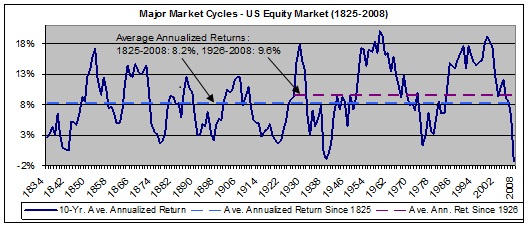Blog
Quarterly Thoughts – Q2 2010
After feeling some recovery related relief after the market bottom in March, 2009, the bumpy last few months are making some investors nervous. Such recovery related dips, however, are not inconsistent with previous strong markets. There have been 11 bull markets since 1945, and during those markets there was a correction of 10% on average, in the 11th month of those recovery markets (this recent correction occurred in the 14th…
Quarterly Thoughts – Q1 2010
Out of the ashes rises the Phoenix – almost. The “ashes” of the financial crisis we have experienced could have given rise to a new “financial Phoenix”: a total standard of fiduciary care and responsibility by the financial industry. It almost happened when legislation was proposed which would have created such a standard. But in the end, it was defeated by powerful, conflicted financial institutions: brokerage firms and the insurance…
Quarterly Thoughts – Q4 2009
“The years teach much which the days never know” – Ralph Waldo Emerson. In the past 18 months we have witnessed the worst crisis for the global financial system since the Great Depression, the steepest stock market decline since World War II, the biggest cut in dividend payments since the 1930s, and the fastest stock market surge in 70 years. Many of the “talking heads” incorrectly predicted the beginning of…
Year-end 2009
On December 31st, we will have completed the first decade of this century and millennium. Think about what we have all experienced in the last 10 years: Y2K without systems collapses; the end of one of the greatest bull markets, two of the four worst markets in history; terrorist attacks on our soil; war in Iraq and Afghanistan; oil prices going through the roof; the acceleration of global warming; the…
Quarterly Thoughts – Q3 2009
During this Global Financial Crisis or “Great Recession,” the foundations of Wall Street and the global financial system were shaken by the collapse of Lehman Brothers, the vanishing of Merrill Lynch as an independent entity, and the take-over of AIG by the government, amongst other events. Roughly six months ago, on March 9th when the Dow Jones Industrial closed at 6,547, the press and average investor felt as if the…
Quarterly Thoughts – Q2 2009
In recent quarters, at the height of investor concern about global economic and market malaise, we reminded you that the market often rebounds significantly after dramatic declines, and that market recoveries usually begin before economies heal. The results of the Second Quarter of 2009 bear this out, as part of what we believe is the beginning of the recovery. For example, the S&P 500 Index and MSCI Emerging Markets Index…
Quarterly Thoughts – Q1 2009

That’s one “mean reversion!” If historical 10-year average cycles are any predictor, now is not the time to abandon long-term strategies (see chart). The response to excess in the form of the dot-com-bomb and the credit-crunch-chaos caused the last 10 years to be one of the worst in U.S. history. However, notice that weak 10-year periods always overshoot the mean, and are often followed by strong recoveries (i.e. your friend,…
Quarterly Thoughts – Q4 2008
The Chinese character for “crisis” is actually a composite of two other characters: “danger” and “opportunity.” Current financial markets are volatile, but also provide opportunity. By rebalancing portfolios, investors “buy low” and “sell high” systematically. At a time when stocks are “on sale,” by not selling, we are in effect “buying” at possibly bargain prices. Discipline pays off over the long haul.
